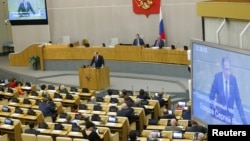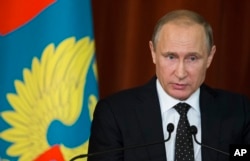Russia’s parliament has approved a package of controversial amendments to its existing counterterrorism laws despite strong criticism from human rights activists, including the head of the Russian president’s rights council.
The amendments were passed last week by the State Duma, the parliament’s lower chamber, and on Wednesday by the Federation Council, the upper chamber.
President Vladimir Putin must sign the legislation in order for it to become law.
The amendments make it a criminal offense to incite unrest, armed rebellion and terrorism in mass media or online. They also require mobile phone companies and Internet service providers to store all telephone conversations, text and picture messages for six months and give authorities access to them.
Companies that provide such services as websites, social networks and messenger apps are required to help authorities decipher encrypted data.
Prison sentences
In addition, the legislation, for the first time in post-Soviet Russia, introduces prison sentences for people who fail to inform the authorities about serious crimes, and increases the number of crimes for which Russians as young as 14 can be prosecuted.
Mikhail Fedotov, the head of the president’s human rights council, denounced the amendments, saying they included provisions that are “not thought-out, ill-conceived, imprecise.” He said he would appeal to Putin not to sign the legislation.
The Congress of the Intelligentsia against War, Russia’s Self-Isolation and the Restoration of Totalitarianism, a group that was formed in March 2014 following the annexation of Crimea and includes some of Russia’s leading human rights activists, also called on Putin not to approve the amendments.
“These amendments can only be characterized as an increase in political repression,” members of the group wrote in an open letter to the Russian president.
Additionally, the legislation would tighten restrictions on religious missionary activities and includes a ban on such activity in residential premises. These provisions were strongly criticized by politicians and clergy in Tatarstan, which has the largest Muslim population among Russia’s 85 federal regions.
Loss of Citizenship
Sergei Lukazhevsky, director of Moscow’s Sakharov Center, which is named after the Soviet dissident Andrei Sakharov, told VOA that while one particularly draconian amendment, allowing the authorities to strip Russians of their citizenship, was dropped from the package, the legislation is still characterized by “dehumanization” and violates both “the principles of freedom of conscience” and Russia’s constitution.
“I would include the section dealing with the so-called limitations on missionary work among the document’s contraventions of the constitution,” Lukazhevsky said. “And here, as we know, the political and religious figures of Tatarstan have voiced their criticism of the project."
Olga Gnezdilova, a prominent Russian human rights lawyer, told VOA that while amendments giving the authorities the power to strip Russians of their citizenship was dropped because it was “absolutely unconstitutional,” the provisions which were approved by parliament, including the one allowing people as young as 14 to be prosecuted for certain crimes, are “a matter of serious concern.”
Gnezdilova also cited a provision among the amendments passed by parliament exempting the authorities from having to pay compensation for houses destroyed during counterterrorist operations, saying it violates property rights.
On the whole, she said, the package of amendments to Russia’s counterterrorism laws passed by the parliament contravene generally accepted international standards and the European Convention on Human Rights.
The legislation has also caused consternation within Russia's telecommunications sector. Prior to its passage by parliament, the heads of leading Russian mobile phone operators MegaFon, VimpelCom, MTS and Tele2 warned that if the legislation were to become law, the federal budget would lose billions of dollars in tax revenues from mobile phone companies.











